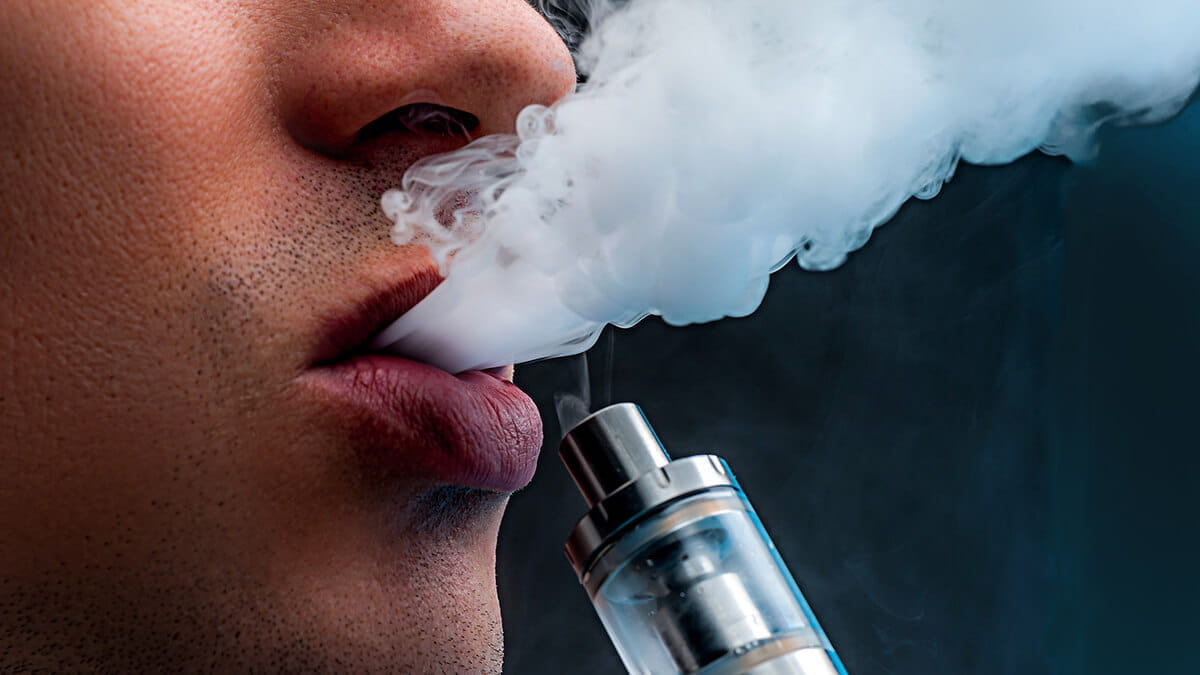While electronic cigarettes, also known as e-cigarettes, were invented in the 20th century,1 their use has proliferated in the past decade. Educating the public about e-cigarette use—commonly known as vaping—has recently become the focal point of local, state, and national public health programs, especially in the past several months as the result of sudden and widespread injuries and death from vaping. The U.S. Centers for Disease Control and Prevention leads these health education efforts nationally.
To counter all of the misinformation out there, the CDC wants the American public to know five important things about vaping and the current health crisis:2
-
Vaping causes lung injury and death, and its cases are on the rise and affecting all ages and regions.
The CDC is using the term “outbreak” to reflect the importance and urgency of recent vaping injuries and deaths. In October 2019, the CDC started acknowledging the condition as EVALI, or e-cigarette or vaping product use–associated lung injury.3
According to the latest CDC data, by October 29, 2019, there had been 1,888 reported EVALI cases and 37 EVALI-related deaths. Of note:2
- There are EVALI cases reported from 49 of the 50 states (only Alaska doesn’t yet have a reported case), the District of Columbia, and the U.S. Virgin Islands.4
- Nearly half of the states (24) have one or more confirmed deaths from vaping-related illness.
- EVALI has caused death to patients ages 17 to 75, with a median age of 53.
- Nearly four in five (79%) EVALI patients are younger than 35, with a median age of 24.
Because the outbreak is spreading so quickly, with hundreds of new cases each week, the CDC updates its vaping data on a weekly basis.
-
Vaping liquid may contain nicotine, THC, CBD oils, and other additive compounds.
Shaped like USB flash drives, pens, ordinary cigarettes, or other common products, vaping products are sometimes called ENDS, short for electronic nicotine delivery systems.5 Instead of lighting tobacco, vaping products “work by heating a liquid to produce an aerosol that users inhale into their lungs.” The vaping liquid may contain nicotine, cannabinoid (CBD) oils, or tetrahydrocannabinol (THC), the high-inducing compound found in marijuana. Many vape liquids also include other additives.2
-
It’s not yet known what aspect of vaping is causing these injuries.
While experts aren’t yet sure exactly what is causing EVALI, the common thread between the infections is vaping and e-cigarette use. An October 22, 2019, CDC report “reinforces that THC-containing products continue to play a major role in the outbreak.” In the study of 867 EVALI patients, respondents reported the following vaping behaviors in the past three months:4
- 86% used THC-containing products
- 64% used nicotine-containing products
- 52% used THC- and nicotine-containing products
- 34% used THC-containing products exclusively
- 11% used nicotine-containing products exclusively
In a CDC statement, the organization disclosed, “No one compound or ingredient has emerged as the cause of these illnesses to date; and it may be that there is more than one cause of this outbreak.” Findings suggest that vape products from informal sources like illicit dealers, friends, and family account for a significant portion of the outbreak.4 Lab tests performed by the Food and Drug Administration have also located some samples containing a combination of THC and vitamin E acetate.6
-
To prevent injury or death, all e-cigarette use should be avoided.
Despite misinformation that vaping can be a safer alternative to traditional tobacco products, the CDC recommends avoiding all vaping products while it continues to investigate the outbreak. As long as the outbreak’s source is unknown, refraining from all e-cigarettes and vaping products is the best way to prevent EVALI illness or death. In particular, the CDC recommends avoiding purchase of vaping products containing THC, especially those sold in illicit markets.2
-
If you’re trying to quit vaping, smoking, or using tobacco products, adopt FDA-approved smoke cessation programs or nicotine replacement therapies.
The CDC does not recommend using vaping products as an alternative to smoking cigarettes, nor using cigarettes as a way to quit vaping. The Centers recommend FDA-approved nicotine replacement therapies2 including patches, gums, lozenges, inhalers, and nasal sprays, which may be effectively combined with other cessation techniques.7
If you’re interested in careers in health education and promotion, Walden University, an accredited university with flexible online education options, offers an online master’s in health education and promotion degree as well as a Master of Public Health online. In both the MS in Health Education and Promotion and Master of Public Health (MPH) degree programs, future global and public health professionals learn to communicate with, educate, and lead local and global communities to promote healthier lifestyles. Walden’s programs can prepare students for myriad public health careers, such as health educator, coordinator, counselor, wellness coach, policy advisor, analyst, and community health outreach professional.*
Walden University is an accredited institution offering Master of Public Health (MPH) and MS in Health Education and Promotion programs online. Expand your career options and earn your master’s degree using a convenient, flexible learning platform that fits your busy life.
*Career options may require additional experience, training, or other factors beyond the successful completion of these degree programs.
1Source: www.casaa.org/historical-timeline-of-electronic-cigarettes/
2Source: www.cdc.gov/tobacco/basic_information/e-cigarettes/severe-lung-disease.html
3Source: www.scientificamerican.com/article/vaping-related-illness-has-a-new-name-evali/
4Source: www.cdc.gov/media/releases/2019/p1028-first-analysis-lung-injury-deaths.html
5Source: www.cdc.gov/tobacco/basic_information/e-cigarettes/index.htm
6Source: www.npr.org/sections/health-shots/2019/10/03/766997708/cdc-intensifies-warnings-about-vaping-illness-as-cases-top-1-000
7Source: smokefree.gov/tools-tips/how-to-quit/using-nicotine-replacement-therapy
Walden University is accredited by The Higher Learning Commission, www.hlcommission.org.




